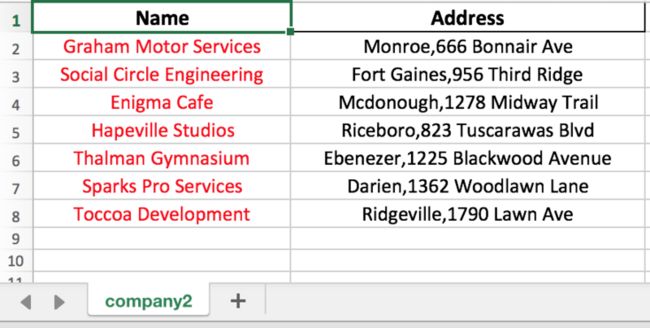Octopus
Octopus 是一个简单的java excel导入导出工具。目的是不用接触Apache POI的API就可以完成简单的Excel导出导入。
同时,可以自定义表格样式,导入检验数据和转换数据
不BB,直接上图
从Maven导入
cn.chenhuanming
octopus
1.1.4
导出Excel
从最简单的例子开始
我们从最简单的例子开始,导出一些地址数据
定义Address类
@Data
@AllArgsConstructor
@NoArgsConstructor
public class Address {
private String city;
private String detail;
}用XML文件定义怎么导出
Root标签的class属性,代表我们要导出的类全限定名
一个Field标签代表Excel里的一列数据
name属性值就是Address里的属性名,实际上Octopus调用其getter方法获取值,所以要确保有getter方法
description属性会被用来绘制表头
我们可以开始做最后一件事,编写Java代码
public class AddressExample {
List addresses;
/**
* preparing testing data
*/
@Before
public void prepare() {
addresses = new ArrayList<>();
DataFactory df = new DataFactory();
for (int i = 0; i < df.getNumberBetween(5, 10); i++) {
addresses.add(new Address(df.getCity(), df.getAddress()));
}
}
@Test
public void export() throws Exception {
//导出文件的is
String rootPath = this.getClass().getClassLoader().getResource("").getPath();
FileOutputStream os = new FileOutputStream(rootPath + "/address.xlsx");
//从XML读取配置,建议单例模式
InputStream is = this.getClass().getClassLoader().getResourceAsStream("address.xml");
Config config = new XmlConfigFactory(is).getConfig();
//用Octopus,只需要一行代码
Octopus.writeOneSheet(os, config, "address", addresses);
}
}这是一个完整的单元测试,可以在单测测试路径找到它
自动绘制表头
Octopus支持导出复杂对象时自动绘制表头
这次我们来导出一些公司数据,这里是Company类
@Data
@AllArgsConstructor
@NoArgsConstructor
public class Company {
private String name;
private Address address;
}然后我们创建一个 company.xml 配置文件
我们用Header元素代表要导出Company的一个复杂属性,同时设置字体颜色是红色
Java代码基本跟之前的一样
public class CompanyExample {
List companies;
/**
* preparing testing data
*/
@Before
public void prepare() {
companies = new ArrayList<>();
DataFactory df = new DataFactory();
for (int i = 0; i < df.getNumberBetween(5, 10); i++) {
companies.add(new Company(df.getBusinessName(), new Address(df.getCity(), df.getAddress())));
}
}
@Test
public void export() throws Exception {
//导出文件的is
String rootPath = this.getClass().getClassLoader().getResource("").getPath();
FileOutputStream os = new FileOutputStream(rootPath + "/company.xlsx");
//从XML读取配置,建议单例模式
InputStream is = this.getClass().getClassLoader().getResourceAsStream("company.xml");
Config config = new XmlConfigFactory(is).getConfig();
Octopus.writeOneSheet(os, config, "company", companies);
}
} 最后是导出的Excel文件
Octopus可以处理更复杂的数据,你可以在cn.chenhuanming.octopus.example.ApplicantExample查看这个更复杂的例子
转换数据
有时你想转换导出的数据。例如,在上一个例子中,我们不想导出整个Address对象,把它当做一个一列数据导出
我们所需要做的只是实现一个Formatter
public class AddressFormatter implements Formatter {
@Override
public String format(Address address) {
return address.getCity() + "," + address.getDetail();
}
@Override
public Address parse(String str) {
String[] split = str.split(",");
if (split.length != 2) {
return null;
}
return new Address(split[0], split[1]);
}
}parse方法用于导入Excel,只要关注format方法。这里接受一个Address对象,返回一个字符串。
最后,配置AddressFormatter到XML文件
最后导出的结果
导入Excel
我们直接拿上一个例子的导出结果来演示导入,共用同一个Config对象,直接编写导入的代码
SheetReader importData = Octopus.readFirstSheet(fis, config, new DefaultCellPosition(1, 0));
for (Company company : importData) {
System.out.println(company);
} 在控制台可以看到打印导入结果,可以看到,之前的AddressFormatter也完成了数据的转换工作
Company(name=Graham Motor Services, address=Address(city=Monroe, detail=666 Bonnair Ave))
Company(name=Social Circle Engineering, address=Address(city=Fort Gaines, detail=956 Third Ridge))
Company(name=Enigma Cafe, address=Address(city=Mcdonough, detail=1278 Midway Trail))
Company(name=Hapeville Studios, address=Address(city=Riceboro, detail=823 Tuscarawas Blvd))
Company(name=Thalman Gymnasium, address=Address(city=Ebenezer, detail=1225 Blackwood Avenue))
Company(name=Sparks Pro Services, address=Address(city=Darien, detail=1362 Woodlawn Lane))
Company(name=Toccoa Development, address=Address(city=Ridgeville, detail=1790 Lawn Ave))导入校验数据
有时候我们对导入的数据有一定的要求,Octopus提供简单的数据校验配置
首先给我们的Company增加一个status属性,只能是 good,bad和closed 三个值其中一个,同时name不可以为空,看一下XML配置文件
这是我们要导入的Excel,可以看到里面有非法数据
看一下怎么编写Java代码
@Test
public void importCheckedData() throws IOException, InvalidFormatException {
InputStream is = this.getClass().getClassLoader().getResourceAsStream("wrongCompany.xlsx");
Config config = new XmlConfigFactory(this.getClass().getClassLoader().getResourceAsStream("company3.xml")).getConfig();
final SheetReader> sheetReader = Octopus.readFirstSheetWithValidation(is,config,new DefaultCellPosition(1,0));
for (CheckedData checkedData : sheetReader) {
System.out.println(checkedData);
}
} 这里我们调用Octopus.readFirstSheetWithValidation,获取带校验结果的SheetReader,看一下导入的结果
CheckedData(data=Company(name=Graham Motor Services, address=Address(city=Monroe, detail=666 Bonnair Ave), status=good), exceptions=[])
CheckedData(data=Company(name=Social Circle Engineering, address=Address(city=Fort Gaines, detail=956 Third Ridge), status=null), exceptions=[cn.chenhuanming.octopus.exception.NotAllowValueException])
CheckedData(data=Company(name=null, address=Address(city=Mcdonough, detail=1278 Midway Trail), status=null), exceptions=[cn.chenhuanming.octopus.exception.CanNotBeBlankException, cn.chenhuanming.octopus.exception.NotAllowValueException])可以看到每一个CheckData有一个data属性和一个exceptions列表。
这个异常列表存放着导入时每一个单元格可能出现的校验错误,异常类型都是ParseException
除了is-blankable和options,还可以通过regex配置正则表达式检查。当校验错误时,会抛出对应的ParseException子类
-
is-blankable:抛出CanNotBeBlankException -
options:抛出NotAllowValueException -
regex:抛出PatternNotMatchException
你通过这些异常来进行跟进一步的处理。如果上面三种校验方式不能满足需求,在Formatter的parse抛出自定义的ParseException。Octopus会捕获它们放到exceptions列表中,并自动把单元格位置和你的配置内容塞到ParseException中
以上代码都可以在测试路径cn.chenhuanming.octopus.example找到,通过这些例子可以感受下Octopus的魅力
注解
我们推荐使用 xml 方式配置导入导出格式,因为 xml 配置与类不相耦合,相比注解更加灵活。
不过有时使用方可能不太在意灵活性,希望把配置和数据类放在一起,那么可以使用注解版本。
注解与 xml 文件的使用方法类似,主要有 @Sheet,@Formatter,@Header,@Field 这几个。
-
@Sheet注解在数据类上,可选formatters属性, 表示全局转换器 -
@Formatter作为@Sheet的 formatters 属性值,表示一个转换器 -
@Header注解在数据类的字段上,表示该字段是一个复合字段 -
@Field注解在数据类的字段上,表示该字段是一个单一字段
注解的的属性取值请参考 xml 文件。下面是一个数据类的注解示例:
@Sheet(formatters = {
@Formatter(target = BigDecimal.class, format = BigDecimalFormatter.class),
})
public class Applicants {
@Field(description = "Value", color = "#74f441")
private int id;
@Field(description = "Name", fontSize = 20, border = "0,2,0,2", borderColor = ",#4242f4,,#4242f4")
private String name;
@Header(description = "Job", headerColor = "#4286f4")
private Job job;
@Field(description = "Entry Date", dateFormat = "yyyy-MM-dd")
private Date entryDate;
@Field(description = "Working/Leaved", options = "Working|Leaved",
formatter = cn.chenhuanming.octopus.formatter.WorkingFormatter.class, color = "#42f4b9")
private boolean working = true;
}
使用方法:
// 构造方法必须传入一个带有 @Sheet 注解的类
Config config = new AnnotationConfigFactory(Applicants.class).getConfig();
// ... 使用 config 就像 xml 的方式一样Q&A
需要操作Apache POI?
Octopus类可以提供一行代码式的API,让你不用碰Apache POI的API。但是如果你确实需要用到Apache POI,可以先看一下Octopus核心类SheetWriter和SheetReader代码。我在设计的时候尽量考虑扩展,并且完全基于接口实现,实在不行可以选择继承重写,属性基本都是protected,或者直接自己实现接口
有建议或者问题?
提Issue或者email我[email protected]




